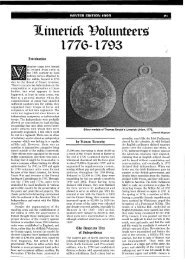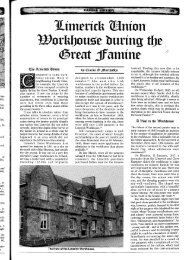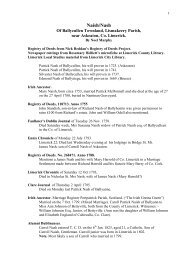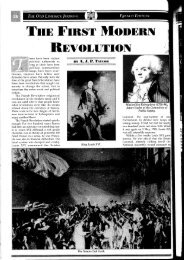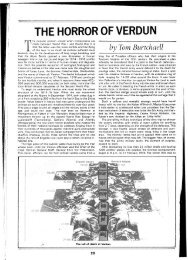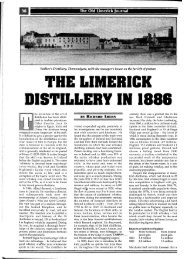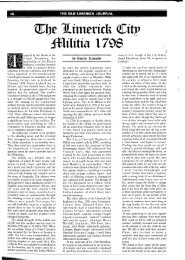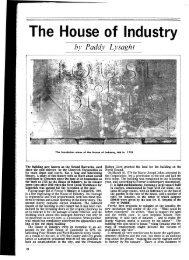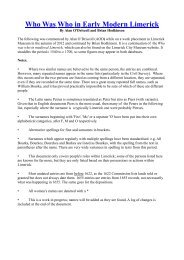pages 555 to 683 (4602 Kb) - Limerick City Council
pages 555 to 683 (4602 Kb) - Limerick City Council
pages 555 to 683 (4602 Kb) - Limerick City Council
You also want an ePaper? Increase the reach of your titles
YUMPU automatically turns print PDFs into web optimized ePapers that Google loves.
James's brother, father, and grandfather had basely deceived them, and<br />
bitterly persecuted their bishops aqd clergy, secular and regular; they<br />
believed that, if the king were res<strong>to</strong>red <strong>to</strong> his crown, he would be prin-<br />
cipally advised by Protestant counsdIors, whose object it would -be <strong>to</strong><br />
promote improper nominees, partizans of the court, and enemies of the<br />
people ; they conceived that by these means the Church would be de-<br />
prived of its freedom and become the slave of a state party, and that the<br />
old project would be revived of appointing Englishmen <strong>to</strong> the vacant<br />
mitres, which had been intrigued fbr in the reign of the first Charles. It<br />
was in reality a ve<strong>to</strong> discussion of the time, and <strong>to</strong> his honour it must be<br />
said, that no one <strong>to</strong>ok a more liveIy part in it, and in the interest of the<br />
Church, than Dr. O'Moloney and his friend Dr. Pierce Creagh, Bishop<br />
of Cork, and afterwards Archbishop of Dublin. The circumstances which<br />
gave rise <strong>to</strong> this state of affairs we shall shortly refer <strong>to</strong>. They appear in<br />
the unpublished report of Father John Young, of the Society of Jesus,<br />
addressed <strong>to</strong> the General Piccolomini, on the incorporation of the Irish<br />
with the English province, and dated at Rome in 1661, where he was then<br />
president of the Irish College. After giving some reasons at great length<br />
against such incorporation, he goes on <strong>to</strong> say:<br />
U But they who are intimately acquainted with the genius of either country,<br />
and the ineradicable hatred which exists between them, cannot on this point<br />
entertain the slightest doubt. The cause of this alienation I would much rather<br />
express orally than in writing.<br />
"bd, The bishops and prelates of Ireland, who here<strong>to</strong>fore valued most<br />
highly the Society, will, for the future, consider as suspected, and the opinion<br />
will again revive which arose twelve years since, when the queen of England<br />
was treating with the Pope by her procura<strong>to</strong>r, regarding the propriety of having<br />
English bishops consecrated for Ireland, <strong>to</strong> which proposition our Irish fathers<br />
were said <strong>to</strong> be favourable, and a great s<strong>to</strong>rm was raised against our order that<br />
the leading men of the kingdom connected with the Supreme <strong>Council</strong>, and who,<br />
up <strong>to</strong> this, entertained the deepest respect for us, resolved that, were the matter<br />
<strong>to</strong> go further, the Society should be expelled the kingdom".<br />
That Dr. O'Moloney was right in believing that Queen Henrietta<br />
Maria's design was entertained by King James, is fully proved by the<br />
king's advice <strong>to</strong> his son, the Chevalier St. George, supposed <strong>to</strong> have been<br />
slain in 1690.'<br />
Referring <strong>to</strong> IreIand he. says :-<br />
' L As <strong>to</strong> the Catholic clergy, great care should be taken <strong>to</strong> fill the dignities<br />
with able, learned, and men of exemplary lives, and <strong>to</strong> break off that evil<br />
which we have <strong>to</strong>o much practiszd, of giving orders <strong>to</strong> young men, and then<br />
sending them abroad <strong>to</strong> study ; and 't woixld not be amiss <strong>to</strong> make some few<br />
English clergy bishops there, and set up colleges, that the youth might not be<br />
obliged <strong>to</strong> be sent <strong>to</strong> study beyond the sea".<br />
In virtue of this indult numerous appointments of Irish bishops were<br />
made? Capara, the agent of Mary of Modena, was the principal negotia<strong>to</strong>r<br />
of these appointments. None of the earlier ones appear <strong>to</strong> have been<br />
excepted <strong>to</strong>'by Dr. O'Moloney, who, in fact owed his own appointment <strong>to</strong><br />
Clarke's Life of Jam- IT., voi. ii. p. 636.<br />
Sir Dad Nairne's Stuart State Papers in the Bodleian Library. Sir David Nairne was<br />
private secretary of King James formany year&<br />
HISTORY OF LIMEBLCK. 617<br />
the mitre of <strong>Limerick</strong> <strong>to</strong> the king's influence. But in' 1694, when he<br />
forwarded <strong>to</strong> Rome, in reply <strong>to</strong> the memorial of Capara, objections <strong>to</strong><br />
Edward Comerford's nomination by the k' <strong>to</strong> the see of Cashel (15th<br />
August, 1693), and also against Dr. Richar Pierce's nomination <strong>to</strong> the<br />
see of Waterford, 23rd July, 1694, objections partly political, partly<br />
personal;' he exhibited a very determined spirit against the proceed~ngs<br />
of James. In this, however, he was not successful. The king replied <strong>to</strong><br />
remonstrances, showing that Dr. Cornerford was a doc<strong>to</strong>r of the<br />
Sorbonne, that he had been many years on the English mission, and<br />
m q years a parish priest in Ireland, and his majesty insinuated that Dr.<br />
O'Moloney'a oppo8i~on arose because he had declined <strong>to</strong> appoint him<br />
<strong>to</strong>'Dublin or <strong>to</strong> Cashel, or <strong>to</strong> a point his nephew the Rev. - Moloney,<br />
P<br />
Vicar of <strong>Limerick</strong>, <strong>to</strong> the see o Killaloe. The bishop's representations,<br />
though they retatded these appointments, did not succeed with the Propsganda<br />
in preventing the archblsho$s bull being forwarded ; he was consecrated<br />
b John Ba tist Hayne, Bishop of Cork, assisted by Dr. Robert<br />
Pieme, &shop of f aterford. We have no further incidents relative <strong>to</strong><br />
Dr. O'Moloney, except those that prove how influential he was at the<br />
court of Louis, negotiating assistance for Ireland when it was most needed<br />
in a perilous crisis of her fortunes. He died in P& on the 3rd of<br />
September, 1702, in the 78th year of his age, and a mural tablet marks<br />
the spot where his remains are interred (see p. 220).<br />
The see of <strong>Limerick</strong>, which was governed for many years bp a vicarpneral,<br />
in the person of the Very Rev. Dr. Jamea Stretch, or Stntch, P.P.<br />
of Rathkeale, remained without a Catholic bishop from the period of the<br />
death of the Right Rev. Dr. Moloney in 1702, <strong>to</strong> the year 1720, wholly<br />
owing <strong>to</strong> the ceaseless penecutions which continued <strong>to</strong> rage after the suoeeas<br />
of King William, and the passionate vehemence of the dominant faction,<br />
which could 0~x1 satiate its vengeance by depriving the Catholics of every<br />
shred of politics I power and social position, in violation of solemn treaties,<br />
and against the dxtates of reason and of 'ustice. At length the Court of<br />
Borne judged it pro er <strong>to</strong> coder the dignity of the see on Comelius<br />
P<br />
O'Keeffe, a native o the county Cork, of the ancient family of the<br />
O'Keeffes of Clounna-Phricane. He had studied with distinction at<br />
Toulouse, where he became a doc<strong>to</strong>r of divinit , and he enjoyed the rec<strong>to</strong>rshi<br />
of the &h of St. Chmnicleu, in the &ocw of Nantz, when the<br />
H ~ P ~ P<br />
See se ected him <strong>to</strong> supply the position which had been occupied<br />
by a long line of illustrious men who preserved the faith in the midst of<br />
every danaer. Denis O'Keeffe, the father of the bishop, was expelled<br />
from his oh fatnil estate of L' Dun n , on the river Bride, b the ruthless<br />
Cmmaelln.' ~ i e many r hardship he settled at Drum h eene, in the<br />
county of <strong>Limerick</strong>, where he left six sons, viz., Daniel, Dennott,<br />
Philip, Donatus, Luke, and Cornelius, the bishop. In the year above<br />
menboned, Cornelius O'Keeffe <strong>to</strong>ok ossession of his see of <strong>Limerick</strong>,<br />
which he carefully governed for t % e space of seventeen yeam, hb<br />
death having taken place in 1737. He founded three bnrses in the<br />
Irish ColIege of Paris for boys of the name of O'Eeeffe, of the family he<br />
was himself; he prescribed rules for the government of the burses, and<br />
1 Sir David Nsirne's Shcatl State Papers in the Bodleian Library. Sir David Nairne wsr<br />
private aecre of Hi Jamea for many years.<br />
V&n*a";Ls;~o ~ames~s lrmg List.<br />
43<br />
I



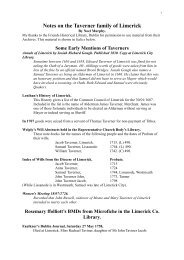

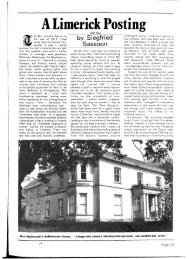
![The Galbally farmer [poem] by Darby Ryan - Limerick City Council](https://img.yumpu.com/24792577/1/190x260/the-galbally-farmer-poem-by-darby-ryan-limerick-city-council.jpg?quality=85)
